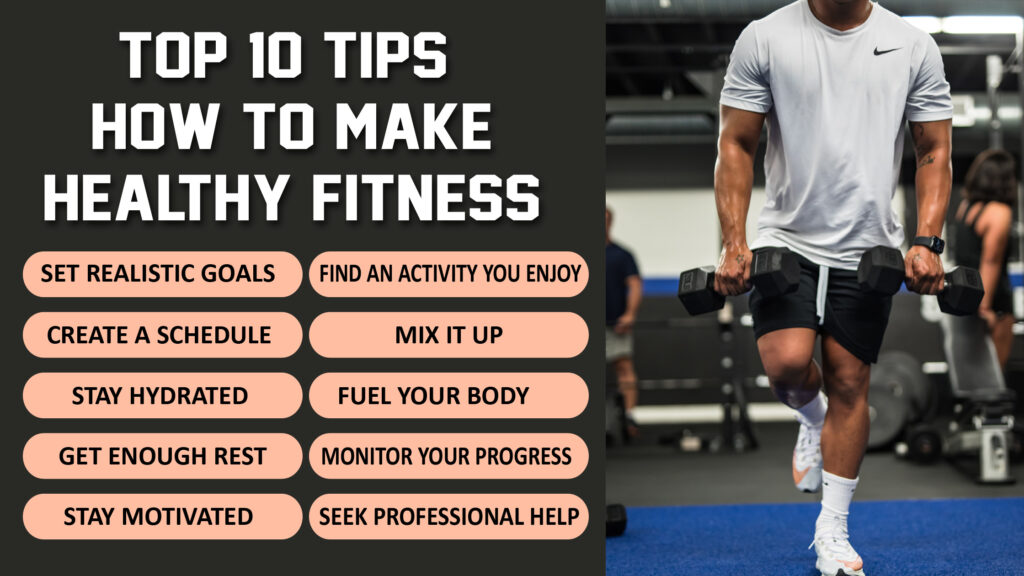Maintaining a healthy fitness level is crucial to leading a healthy lifestyle. It is not just about looking good, but also about feeling good and reducing the risk of various health problems. The following tips can help you make healthy fitness a part of your daily routine. Top 10 Tips How to Make Healthy Fitness

- Set Realistic Goals: The first step towards making healthy fitness is to set realistic goals. If you aim too high, you may end up feeling discouraged and quitting your fitness routine. Start with small goals and gradually increase the intensity and duration of your workouts. This will help you achieve your goals while also preventing injuries.
- Find an Activity You Enjoy: The second step is to find an activity that you enjoy doing. If you hate running, you are unlikely to stick with it for long. On the other hand, if you enjoy dancing, you are more likely to look forward to your workout sessions. You can try different activities until you find one that you enjoy.
- Create a Schedule: The third step is to create a schedule and stick to it. Consistency is key when it comes to making healthy fitness a part of your daily routine. Make a plan that works for you and fits into your daily schedule. You can schedule your workouts in the morning, afternoon, or evening, depending on your preferences.
- Mix It Up: The fourth step is to mix up your workouts. Doing the same workout every day can get boring and can also lead to a plateau in your progress. Mix up your workouts by trying new activities, changing the intensity or duration of your workouts, or adding new exercises to your routine.
- Stay Hydrated: The fifth step is to stay hydrated. Drinking plenty of water before, during, and after your workouts is crucial to maintaining a healthy fitness level. Dehydration can lead to fatigue, dizziness, and even heat exhaustion. Make sure to drink at least eight glasses of water a day, and more if you are sweating excessively during your workouts.
- Fuel Your Body: The sixth step is to fuel your body with the right nutrients. Eating a healthy and balanced diet that includes protein, carbohydrates, and healthy fats is essential to maintaining a healthy fitness level. Make sure to eat a nutritious meal before and after your workouts to provide your body with the energy it needs.
- Get Enough Rest: The seventh step is to get enough rest. Rest is essential for recovery and muscle growth. Make sure to get enough sleep every night and take rest days when necessary. Over training can lead to injuries and can also hinder your progress.
- Monitor Your Progress: The eighth step is to monitor your progress. Keeping track of your progress can help you stay motivated and also help you identify areas where you need to improve. You can track your progress by keeping a workout journal or using fitness apps.
- Stay Motivated: The ninth step is to stay motivated. Motivation is essential when it comes to making healthy fitness a part of your daily routine. Find ways to stay motivated, such as listening to music, working out with a friend, or rewarding yourself after reaching your goals.
- Seek Professional Help: The tenth step is to seek professional help if necessary. If you have any health conditions or injuries, it is important to seek professional help before starting a new fitness routine. A personal trainer or a doctor can help you develop a safe and effective workout plan.
making healthy fitness a part of your daily routine requires dedication and commitment. By following the tips mentioned above, you can achieve your fitness goals and maintain a healthy fitness level. Remember to set realistic goals, find an activity you enjoy, create a schedule, mix up your workouts, stay hydrated, fuel your body, get enough rest, monitor your progress, stay motivated, and seek professional help if necessary. With these tips, you

Top 10 Tips How to Make Healthy Fitness
Very Important Point for How to Make Healthy Fitness
- Eat a balanced diet: A healthy diet is essential for maintaining good health. Make sure to include plenty of fruits, vegetables, whole grains, lean protein, and healthy fats in your diet.
- Stay hydrated: Drinking plenty of water is essential for staying healthy. Aim to drink at least eight glasses of water a day, and more if you’re active or live in a hot climate.
- Exercise regularly: Regular exercise is important for maintaining good health. Aim for at least 30 minutes of moderate-intensity exercise most days of the week.
- Get enough sleep: Getting enough sleep is essential for your physical and mental health. Aim for 7-9 hours of sleep each night.
- Manage stress: Stress can have a negative impact on your health. Try to manage stress through activities such as yoga, meditation, or deep breathing exercises.
- Practice good hygiene: Good hygiene is important for preventing the spread of illness. Wash your hands regularly, cover your mouth and nose when you cough or sneeze, and avoid touching your face.
- Stay up to date on vaccinations: Vaccinations can prevent a variety of illnesses and diseases. Stay up to date on your vaccinations to protect yourself and those around you.
- Limit alcohol consumption: Excessive alcohol consumption can have a negative impact on your health. Limit your alcohol consumption to moderate levels.
- Don’t smoke: Smoking is a leading cause of preventable death. Quitting smoking can have significant health benefits.
- Stay connected: Social connections are important for your mental health. Stay connected with friends and family, and join social groups or clubs to meet new people.
- Practice safe sex: If you are sexually active, it is important to practice safe sex to protect yourself from sexually transmitted infections (STIs).
- Protect your skin from the sun: Overexposure to the sun can lead to skin damage and increase your risk of skin cancer. Protect your skin by wearing protective clothing, using sunscreen, and avoiding the sun during peak hours.
- Monitor your mental health: Mental health is just as important as physical health. Be mindful of your mental health and seek help if you are experiencing symptoms of depression, anxiety, or other mental health conditions.
- Take breaks from technology: Spending too much time in front of screens can be detrimental to your health. Take regular breaks from technology to give your eyes a rest and engage in other activities.
- Stay up to date on health screenings: Regular health screenings can help detect potential health issues early on. Make sure to stay up to date on recommended screenings such as mammograms, colonoscopies, and blood pressure checks.
Taking care of your health doesn’t have to be complicated. By following these top 10 tips, you can improve your overall health and well-being. Start small, and gradually incorporate these healthy habits into your daily routine to create lasting change. Remember, small changes can make a big difference in your health!



